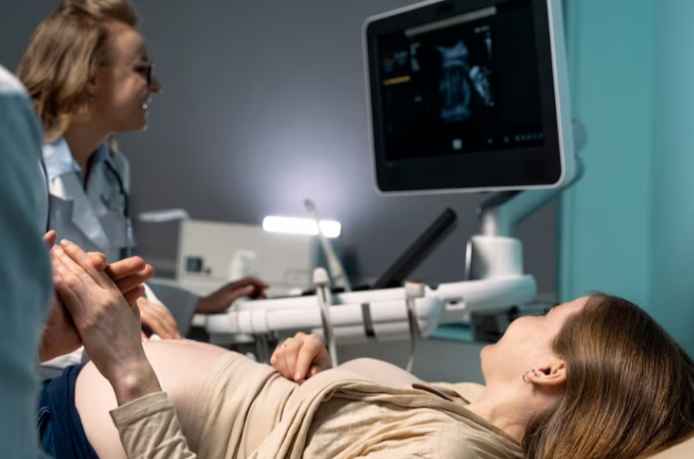Introduction:
The journey of pregnancy is a miraculous and joyous one. It’s a time filled with anticipation, excitement, and a touch of nervousness. One of the incredible tools modern medicine offers to expectant parents is the ultrasound. So, what is an ultrasound in pregnancy? In this guide, we’ll take you through everything you need to know about ultrasounds during pregnancy, from their purpose and procedure to the incredible insights they provide.
What is an Ultrasound in Pregnancy?
An ultrasound in pregnancy is a non-invasive medical procedure that uses high-frequency sound waves to create visual images of the developing fetus inside the mother’s womb. These images provide valuable information about the baby’s growth, health, and development, offering both medical professionals and expectant parents a glimpse into the world of the unborn child.
The Significance of Ultrasound in Pregnancy
Ultrasounds play a pivotal role in prenatal care and monitoring. They offer a wide range of benefits:
- Confirming Pregnancy: In the early stages, ultrasounds help confirm the presence of a pregnancy and determine the embryo’s location.
- Checking Fetal Development: Ultrasounds provide insights into the baby’s growth, organ development, and overall well-being.
- Detecting Abnormalities: Certain birth defects and abnormalities can be detected early through ultrasounds, enabling parents and medical teams to prepare for any necessary interventions.
- Monitoring Multiple Pregnancies: For mothers expecting twins or multiples, ultrasounds help track the development of each fetus individually.
- Determining Due Dates: Ultrasounds assist in accurately estimating the due date, ensuring proper prenatal care and preparation.
The Ultrasound Procedure
The ultrasound procedure is safe, painless, and typically conducted by a trained sonographer or healthcare professional. Here’s what you can expect during an ultrasound:
- Preparation: Depending on the type of ultrasound (abdominal or transvaginal), you may be asked to have a full bladder or an empty bladder.
- Gel Application: A special gel is applied to your abdomen or a probe for transvaginal ultrasounds. This gel helps transmit sound waves and improve image quality.
- Transducer Movement: The transducer, a handheld device, is gently moved over your abdomen or inserted into the vagina. It emits sound waves that bounce off internal structures and create images on a monitor.
- Image Interpretation: The images captured are interpreted by a medical professional. They will explain the findings, addressing any concerns or questions you may have.
Types of Ultrasounds in Pregnancy
Ultrasounds come in different forms, each serving a specific purpose:
- Transabdominal Ultrasound: This is the most common type, where a transducer is moved over the abdomen to capture images. It’s used for general check-ups and initial screenings.
- Transvaginal Ultrasound: A probe is inserted into the vagina, allowing for a closer and clearer view of the early stages of pregnancy.
- 3D and 4D Ultrasounds: These advanced ultrasounds create three-dimensional images, providing a more lifelike view of the fetus.
- Doppler Ultrasound: It measures blood flow and is used to assess the placenta and umbilical cord.
FAQs About Ultrasound in Pregnancy
Is Ultrasound Safe During Pregnancy?
Absolutely! Ultrasounds have been used for decades and are considered safe for both the mother and the baby. The procedure uses sound waves, not radiation, making it non-invasive.
How Many Ultrasounds Are Typically Done During Pregnancy?
Most pregnant individuals undergo at least two ultrasounds: one in the first trimester and another in the second trimester. Additional ultrasounds may be recommended based on medical conditions or concerns.
Can I Determine the Gender of My Baby Through an Ultrasound?
In many cases, yes! Around the 18th to 20th week, a skilled sonographer can often determine the baby’s gender through ultrasound imaging.
What if an Abnormality is Detected?
If an abnormality is detected, further tests or evaluations may be recommended. Remember that an abnormality doesn’t necessarily mean a serious issue, but additional monitoring and care may be required.
Do I Have to Have an Ultrasound?
While ultrasounds are beneficial, they are not mandatory. However, they offer valuable information that can aid in your baby’s healthy development.
How Can I Ensure I Get Quality Ultrasound Images?
To get the best images, follow your healthcare provider’s instructions for preparation. Staying hydrated before the ultrasound can also improve image quality.
Conclusion:
In conclusion, an ultrasound in pregnancy is a remarkable tool that offers parents a unique glimpse into the life growing within. From confirming pregnancy and monitoring development to detecting potential concerns, ultrasounds play an integral role in modern prenatal care. With its safety, benefits, and incredible images, ultrasound truly is a window to the future of your family.





